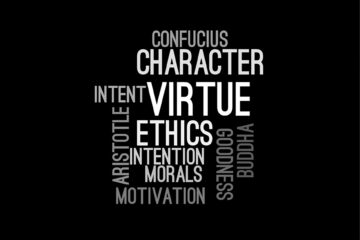![]()
Introduction:
A society at any given point of time cannot exist unless there is order and conformity to the laws and the individuals live up to a certain set of norms where their selfish impulses are subjugated by the need for welfare for the whole society. In order to control any marked deviation from the societal norms. According to the sociologist McIver, social control is, “the way in which entire social order coheres and maintains itself- how it operates as a whole, as a changing, equilibrium.” Such control at any given point in society is essential as it brings about social conformity, forges solidarity and is vital in ensuring the continuity of a social group or society.
There are two types of agencies of control in any given society i.e. formal and informal agencies. Formal agencies are those like laws, education, political system, coercion and codes etc. Informal agencies include beliefs, religion, folkways and mores etc[1].
The folkways, mores and customs were a sufficient means of control in the primitive societies as they were not met with any defiance and were complied with by all individuals. But, as the societies progressed into civilized, modern societies, the hold of the customs began to loosen up and it gave way to the laws which were enacted by the State itself.
Meaning of Law
There is a no set definition of what law is. According to some, laws are nothing but he codified mores, while according to others these are the rules which are enforced by the States through the Courts. There is no set agreement among the scholars about the definition of law which would be applied to the prehistoric legal agreements, the Hammurabi Code and the law of the present modern societies. There is one set of juristic thinkers who take a different view of law and consider it to be the command of the sovereign and then those who take the sociological view, take law as rules of right conduct. Those with the former view, observe that the jurisprudence makes it easier for the word ‘law’ to be used in a specialized sense. The proponents of the latter view hold that, even in the primitive societies there was something resembling law and that rules of voluntary associations control the behaviour of the individuals as does the law of the land. The enforcement by the way of the dictate or command of the sovereign is not an essential element.
Thus, in a wider sense, the law includes all rules of conduct which are observed by individuals as a force of habit. In the narrower sense, the law means that body of rules which is recognized, made, enforced and interpreted by the state.
The law at any given point of time possesses some certain characteristics like; laws are the general setting of the human doings which have been approved by the state for its citizens. A law is considered legitimate only if it is enacted by a legal authority having the sanction of the state, it is not something which is mindlessly applied to the citizens but is a product of thought, planning and deliberations which then result in the formulation of the same. The laws are definite, clear and well-defined. The principle of rule of law, which states that law, is applied to everyone without the exceptions or favours and no one is above the law. The law shows uniformity in its application by the Courts in identical circumstances. The violation of the law results in the penalties which are determined by the State’s authority.[2]
The proponents of the Social Contract Theory, mainly Thomas Hobbes, John Locke and Jean Rousseau, have focused on the creation of the state as an agreement between the people and this becomes the primary reason for the people to obey the authority of the state. The state emerged because of the agreement between the people and acts as a sanction and thus the laws which are introduced by the state acts as an agency of control for the people as it came to be by the consciousness of the people in the society and thus binds the individuals to the authority of the state and the law. According to Rousseau, the general will of the whole community is the actual source of the state, sovereignty, laws, rights and liberties of the people.
Difference between Custom and Law
To get a deeper understanding of the law as an agency of control it is important to establish the difference between custom and law.
- Law is a make, the custom is a growth: Law is expressly and mindfully made by the authority authorized by the state to do so. The custom, on the other hand, is something which is the result of gradual evolution and lacks an enactment in the express terms and develops without the sanction of an authority to apply it or safeguard it.
- Law needs a special agency for enforcement, custom does not: Law is applied by the help of a special agency and it gets sanction by a coercive agency having properly organized setup. No penalty is there for the violator of a custom whereas punishment is there for the person violating the law.
- Law is specific, customs are not: One of the most significant features of the law is that it is specific, precise, definite and clear; they are codified in the way of books and can be accessed by anyone at any time. Customs on the other hand lack definitiveness or clarity and it is difficult for an individual to know all the laws of the land.
- Law is more flexible than custom: At the time of some emergency, it is difficult to change some custom whereas a law can be amended in such a situation to meet the crisis, a sudden change is not possible in a custom. The law can be amended, abolished or introduced with the change in time and conditions.
- Law is more idealistic than the customs: Law presents an ideal standard of behaviour which is to be observed and endeavoured by society. The customs are the product of the experience and deals with the daily routine of a person’s life. Law has the power to reform or abolish the customs to bring them in tune with the changing times and conditions in a society. For example, practices like bigamy have been expressly abolished although they might have been prevalent customarily before the enactment of the Hindu Marriage Act, 1955.
It has been observed that the state many times introduces such acts which are in direct contradiction to the customs. When law clashes with certain customary practices, then the law has to rely mostly on the sanction by force. People have to obey the law even though it contradicts their customary practices. The forced obedience might even result in resistance by some groups in a society. The law must be in the direction of social change and not against it. There have been many examples in our country where although the law has been enforced but still the customary practices could not be regulated because of the attitude of the people backed by ignorance and prejudice.
The law has often been used as an important instrument of social change and many laws have been introduced enforcing equality and prohibiting practices like untouchability and child marriage. One of the great advantages of law is that it has the great ability to change with the changing times and helps in maintaining stability in the society when the rapid changes occur in the society which tends to alter and disturb the relations in the society. Law helps in assimilating the changes. Law, by bringing in changes at the societal level helps in bring a change at the national as well as international level.
As the societies grew in size and complexity, the informal agencies of social control gave way to the more formal and codified form of rules and regulations. These laws defined the standard of behaviour expected from each individual and then also defined the penalties wherever there was a violation of the laws. Law is a body of rules which is enacted by the body which has the sanction of the state and the enforcement of the laws also take place by the way of the agencies which are duly authorized by the state. Laws in the modern states clearly define the rights and duties of the individuals and along with that the punishments and penalties are also given which would be applied upon the violation of those laws[3]. The present societies are different from the earlier societies and thus the informal means of control are insufficient to have order in the society.
Conclusion
The structure of the societies is such at the present that the security of life and property along with the need for the ordering of society in a systematic order makes it necessary to have a formal system set of rules. The laws guarantee uniformity and regularity in the system of norms and penalties all along with society. The body of law is expanding, what were earlier the mores and customs have now been included in the formal body of law. The Hindu Marriage Act, 1955 lays down the rules which regulate the marriage among the Hindus, it now recognizes the right to divorce a wife or husband which was not customarily available. A number of laws have been put in place which now governs the handling of food, fire protection, disposal of sewage, traffic, education, entertainment etc. The Cigarettes and Other Tobacco Products (Prohibition of Advertisement and Regulation of Trade and Commerce, Production, Supply and Distribution) Act, 2003 is a comprehensive enactment which controls the tobacco consumption in India and smoking is banned in public places by the same Act. In this way, law exercises great control over the behaviour of people in modern societies and plays a significant part in maintaining control.
References:
[1]https://www.lkouniv.ac.in/site/writereaddata/siteContent/202004120825283934tara_bhatt_anthro_law_and_social_control.pdf
[2]Social Control II. Law and Public Opinion Author(s): Edward Alsworth Ross Source: American Journal of Sociology , May, 1896, Vol. 1, No. 6 (May, 1896), pp. 753- 770 Published by: The University of Chicago Press Stable URL: https://www.jstor.org/stable/2761482
[3]https://www2.palomar.edu/anthro/control/con_2.htm#:~:text=Social%20Control%3A%20Law&text=Social%20control%20entails%20rules%20of,desirable%20but%20not%20necessarily%20compulsory.



0 Comments